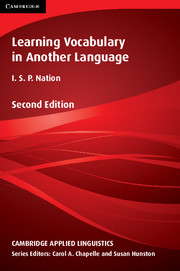Book contents
- Frontmatter
- Contents
- Series editors' preface
- Acknowledgements
- Introduction
- 1 The goals of vocabulary learning
- 2 Knowing a word
- 3 Teaching and explaining vocabulary
- 4 Vocabulary and listening and speaking
- 5 Vocabulary and reading and writing
- 6 Specialised uses of vocabulary
- 7 Vocabulary-learning strategies
- 8 Learning words from context
- 9 Word parts
- 10 Using dictionaries
- 11 Deliberate learning from word cards
- 12 Finding and learning multiword units
- 13 Testing vocabulary knowledge and use
- 14 Designing the vocabulary component of a language course
- Appendices
- Subject index
- Author index
10 - Using dictionaries
Published online by Cambridge University Press: 15 February 2018
- Frontmatter
- Contents
- Series editors' preface
- Acknowledgements
- Introduction
- 1 The goals of vocabulary learning
- 2 Knowing a word
- 3 Teaching and explaining vocabulary
- 4 Vocabulary and listening and speaking
- 5 Vocabulary and reading and writing
- 6 Specialised uses of vocabulary
- 7 Vocabulary-learning strategies
- 8 Learning words from context
- 9 Word parts
- 10 Using dictionaries
- 11 Deliberate learning from word cards
- 12 Finding and learning multiword units
- 13 Testing vocabulary knowledge and use
- 14 Designing the vocabulary component of a language course
- Appendices
- Subject index
- Author index
Summary
Dictionaries can be used for a wide range of purposes. Scholfield (1982b; 1997) has consistently distinguished between the different requirements and strategies for dictionaries which are to be used for comprehension (listening and reading) and dictionaries which are to be used for production (speaking and writing). As well as being sources of information, dictionaries can also be aids to learning (Nation, 1989). The following list covers most purposes for dictionary use:
Comprehension (decoding)
• Look up unknown words met while listening, reading or translating.
• Confirm the meanings of partly known words.
• Confirm guesses from context.
Production (encoding)
• Look up unknown words needed to speak, write, or translate.
• Look up the spelling, pronunciation, meaning, grammar, constraints on use, collocations, inflections and derived forms of partly known words needed to speak, write or translate.
• Confirm the spelling etc. of known words.
• Check that a word exists.
• Find a different word to use instead of a known one.
• Correct an error.
Learning
• Choose unknown words to learn.
• Enrich knowledge of partly known words, including etymology.
In the following sections we will look at these various purposes in more detail.
Do learners use dictionaries well?
Studies of second language learners' dictionary use have involved questionnaires (Bejoint, 1981; Tomaszczyk, 1979), analysis of filmed recordings (Ard, 1982), observing dictionary use (Atkins and Varantola, 1997) and filling out flowcharts immediately after dictionary use (Harvey and Yuill, 1997).
- Type
- Chapter
- Information
- Learning Vocabulary in Another Language , pp. 414 - 436Publisher: Cambridge University PressPrint publication year: 2013

